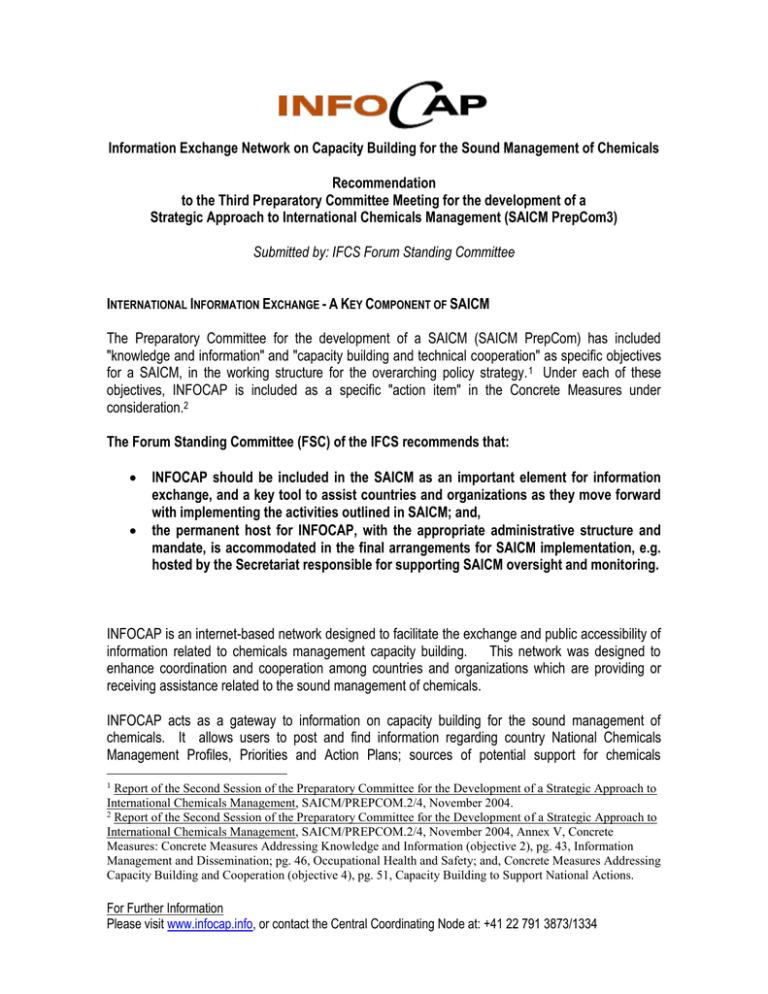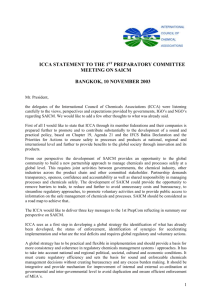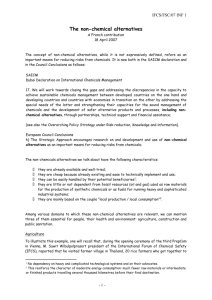Information Exchange Network on Capacity Building for the Sound Management... Recommendation
advertisement

Information Exchange Network on Capacity Building for the Sound Management of Chemicals Recommendation to the Third Preparatory Committee Meeting for the development of a Strategic Approach to International Chemicals Management (SAICM PrepCom3) Submitted by: IFCS Forum Standing Committee INTERNATIONAL INFORMATION EXCHANGE - A KEY COMPONENT OF SAICM The Preparatory Committee for the development of a SAICM (SAICM PrepCom) has included "knowledge and information" and "capacity building and technical cooperation" as specific objectives for a SAICM, in the working structure for the overarching policy strategy. 1 Under each of these objectives, INFOCAP is included as a specific "action item" in the Concrete Measures under consideration.2 The Forum Standing Committee (FSC) of the IFCS recommends that: INFOCAP should be included in the SAICM as an important element for information exchange, and a key tool to assist countries and organizations as they move forward with implementing the activities outlined in SAICM; and, the permanent host for INFOCAP, with the appropriate administrative structure and mandate, is accommodated in the final arrangements for SAICM implementation, e.g. hosted by the Secretariat responsible for supporting SAICM oversight and monitoring. INFOCAP is an internet-based network designed to facilitate the exchange and public accessibility of information related to chemicals management capacity building. This network was designed to enhance coordination and cooperation among countries and organizations which are providing or receiving assistance related to the sound management of chemicals. INFOCAP acts as a gateway to information on capacity building for the sound management of chemicals. It allows users to post and find information regarding country National Chemicals Management Profiles, Priorities and Action Plans; sources of potential support for chemicals 1 Report of the Second Session of the Preparatory Committee for the Development of a Strategic Approach to International Chemicals Management, SAICM/PREPCOM.2/4, November 2004. 2 Report of the Second Session of the Preparatory Committee for the Development of a Strategic Approach to International Chemicals Management, SAICM/PREPCOM.2/4, November 2004, Annex V, Concrete Measures: Concrete Measures Addressing Knowledge and Information (objective 2), pg. 43, Information Management and Dissemination; pg. 46, Occupational Health and Safety; and, Concrete Measures Addressing Capacity Building and Cooperation (objective 4), pg. 51, Capacity Building to Support National Actions. For Further Information Please visit www.infocap.info, or contact the Central Coordinating Node at: +41 22 791 3873/1334 management projects; past, on-going and planned chemicals management projects; chemicals management guidance and training materials; and, key contacts in the field of chemical safety. INFOCAP is a unique information exchange mechanism, as it enables users to search for information by country, across a wide range of materials (i.e. from National Profiles to training materials), and according to specific categories (e.g. hazard and risk assessment) and key words (e.g. obsolete chemicals). INFOCAP provides summary information about capacity building activities and acts as an entry point and directory for more detailed information. INFOCAP, in its start-up phase, is mandated by governments and organizations through the Intergovernmental Forum on Chemical Safety (IFCS) as a voluntary system where countries and organizations are responsible for adding and entering their own information. Many countries and organizations have already posted information. A formal review of INFOCAP was recently undertaken by the INFOCAP Steering Group, in order to provide an assessment of the use and effectiveness of the network. The main conclusions from the review include the following3: There is strong support for a fully functioning INFOCAP. All stakeholders indicated that INFOCAP has the potential to provide an effective means for exchanging information. A fully functioning INFOCAP network is particularly important for developing countries and NGOs. The INFOCAP Steering Group agreed that there must be a substantial change in the management structure of INFOCAP. The FSC proposes the establishment of a well-resourced permanent secretariat. The precise role of this secretariat, i.e. whether it will serve a pro-active role assisting with the input and maintenance of data, or a facilitating role, will need to be determined in conjunction with the identification of the permanent host and available resources. The permanent host for INFOCAP, with the appropriate administrative structure and mandate, should be accommodated in the final arrangements for SAICM implementation, e.g. hosted by the Secretariat responsible for supporting SAICM oversight and monitoring. In further developing INFOCAP, there should be no duplication of efforts, including at the level of data entry4. Any decision on broadening of services/scope of INFOCAP, for example to add an interactive service or clearinghouse mechanism, should be deferred until a permanent host is identified. The Annex to this paper provides brief background about INFOCAP and an update on the status of the system. 3 For a copy of the detailed INFOCAP Evaluation and Future Direction Recommendations Report (IFCS/INFOCAP/SG39), please contact the INFOCAP Central Coordinating Node at: infocap@who.int 4 INFOCAP should be considered as a network which can respond to new requests for capacity building databases, such as the request in the Bali Strategic Plan for Technology Support and Capacity Building for UNEP to develop a database giving access to information on major existing technology support and capacitybuilding activities (adopted at the 23rd session of the UNEP Governing Council, UNEP/GC.23/6/Add.1, pg. 5). 2 Annex Background and Mandate for INFOCAP Discussions about the need for a coordinated approach to information exchange on chemicals management capacity building started in 1996. A UNEP Report from the First Session of the Government Designated Group of Experts on Further Measures to Reduce the Risks from a Limited Number of Hazardous Chemicals (UNEP/PIC/EC/1/3/July 1996), recommended that the Governing Council of UNEP "Call upon IFCS to identify country needs for capacity-building for the sound management of chemicals and recommend providing a mechanism to encourage partnerships between recipients and donors of technical assistance to help coordinate these activities." At their 19th session (1997), the UNEP Governing Council invited governments, IGOs, and the IFCS to review the capacity building recommendations in the report of the Expert Group and to consider taking action to implement them. The development of an Information Exchange Network on Capacity Building for the Sound Management of Chemicals was supported at the third Inter-sessional Meeting of the Intergovernmental Forum on Chemical Safety (IFCS) in 1998. At its third session, held in October 2000, in Brazil, the IFCS officially endorsed the development of INFOCAP, and support for the network was re-affirmed in November 2003 at IFCS Forum IV in Bangkok, Thailand. INFOCAP is endorsed by, and receives guidance from, the IFCS. It follows the general IFCS principles of cooperation, i.e. the involvement of, and partnership among, governments, international organizations and non-governmental organizations. INFOCAP Oversight and Development INFOCAP has been developed by, and is currently overseen by several Lead Sponsors and a Steering Group. The Lead Sponsors for INFOCAP are: The Intergovernmental Forum on Chemical Safety (IFCS); The European Commission through the European Chemicals Bureau (EC/ECB); The United Nations Institute for Training and Research (UNITAR); and, The Organization for Economic Cooperation and Development (OECD) (Collaborating Partner). The IFCS Secretariat currently serves as a Central Coordinating Node for INFOCAP, providing support in maintaining INFOCAP, and in communicating with participating countries and organizations. The Steering Group consists of representatives from of eight governments, two NGOs, and 8 IGOs. Both the Lead Sponsors and Steering Group members have responsibilities for developing and maintaining INFOCAP, and for raising awareness about INFOCAP. Organizations and countries participating in INFOCAP are asked to designate Points of Contact, to coordinate regular information contributions to INFOCAP, and to ensure that the information posted is relevant and complete. Points of Contact also assist with raising awareness activities. The European Commission has provided substantial support for the implementation of INFOCAP. The European Commission is currently funding a three year (2004-2007) INFOCAP awareness raising and training initiative for developing countries and non-governmental organizations, which will contribute greatly to the further implementation of INFOCAP. 3 International Recognition of INFOCAP One of the key objectives highlighted in the Terms of Reference is that INFOCAP was developed to: “…provide a general framework for ensuring linkages among global, regional and national capacity building activities, including those facilitated through the IFCS regional groups and in the context of international agreements, such as ILO Convention 170, the Rotterdam Convention on Prior Informed Consent, the Stockholm Convention on POPs, and others.” In this regard, in addition to SAICM PrepCom1, INFOCAP has been recognized in the following international meetings and governing council decisions: The UNEP Governing Council Decision 21/7 requested that the Executive Director “…assist in the development of an information exchange network on capacity-building for the sound management of chemicals”; The Final Report of the 6th meeting of the Conference of the Parties to the Basel Convention, held in Geneva from 9-13 December 2002, states that: "Several representatives drew attention to a presentation that had been made in the course of the Conference by the Information Exchange Network on Capacity-building for the Sound Management of Chemicals (INFOCAP), describing INFOCAP as an essential tool for capacity-building over entire life-cycles, including final disposal." The Draft Report of the 7th meeting of the Intergovernmental Negotiating Committee on Persistent Organic Pollutants draws participants attention to the launch of INFOCAP and invites participants to regularly use and contribute to the network (final wording needed). The Draft Report of the 9th meeting of the Intergovernmental Negotiating Committee on Persistent Organic Pollutants notes that “…the Information Exchange Network on Capacity Building for the Sound Management of Chemicals (INFOCAP) could successfully support assistance” related to the technical implementation of chemicals conventions (final wording needed). The Final Report from the WSSD Global Partnership Meeting on the Globally Harmonized System for Classification and Labelling of Chemicals (GHS) notes that in developing the GHS website, “UNITAR will ensure full complementarity of its efforts with INFOCAP.” The Intergovernmental Negotiating Committee (INC) for the Rotterdam Convention on Prior Informed Consent has taken note of INFOCAP. At the ninth INC, held in October 2002, it was noted that INFOCAP could successfully support technical assistance for certain areas of the Convention. At the tenth INC, held in November 2003, it was recommended that the Rotterdam Convention clearing-house should coordinate with INFOCAP to avoid duplication of effort. Decision INC-10/7 on the strategic approach to technical assistance, invites countries to identify their capacity-building and technical assistance needs, and also invites donors to inform developing countries of their activities, through the INFOCAP network set up under the IFCS. Status of INFOCAP Development and Contributions 4 The pilot phase of the INFOCAP web site was launched in July 2003. Over 89 Points of Contact have been designated and nearly 600 data entries have been made and are now listed on the INFOCAP web site A formal review of INFOCAP was recently undertaken by the INFOCAP Steering Group, in order to provide an assessment of the use and effectiveness of the network. The main conclusions from the review are5: There is strong support for a fully functioning INFOCAP. All stakeholders indicated that INFOCAP has the potential to provide an effective means for exchanging information. A fully functioning INFOCAP network is particularly important for developing countries and NGOs. There are several reasons why INFOCAP is currently not functioning to its full potential: o Some IGOs state that they have no mandate or policy to contribute to INFOCAP. o In some instances, relevant data already exists in other databases. o The reason or benefit in entering information into INFOCAP is not seen by some stakeholders. o Some countries and organizations indicated that they lack the resources to enter and maintain their data on INFOCAP. Experience demonstrates that INFOCAP cannot operate on a voluntary basis, i.e. with countries and organizations submitting their own data. A clear political and financial commitment is needed to maintain and further develop INFOCAP. This includes identification of a permanent host for INFOCAP with respective political commitment and sustainable financial resources. Based on the results of this review, the Forum Standing Committee has recommended several changes to INFOCAP, as follows: Operational Structure: There must be a substantial change in the operational structure of INFOCAP:: Development of a "portal" structure, with an advanced, targeted search mechanism. Continuation of the current web-based platform (repository/database for information), in particular, to support NGOs and developing countries who do not have their own web sites/information exchange mechanisms. The Oracle database and INFOCAP server facility provided by ECB remains available for the further development of INFOCAP. Management structure: There must be a substantial change in the management structure of INFOCAP: Establishment of a well-resourced permanent secretariat. The precise role of this secretariat, i.e. whether it will serve a pro-active role assisting with the input and maintenance of data, or a facilitating role, will need to be determined in conjunction with the identification of the permanent host and available resources. 5 For a copy of the detailed INFOCAP Evaluation and Future Direction Recommendations Report (IFCS/INFOCAP/SG39), please contact the INFOCAP Central Coordinating Node at: ifcs@who.int 5 The current verification/authorization process by Lead Sponsors and Points of Contacts should be reviewed and amended, as necessary. The current responsibilities of the lead sponsors for verification of contributions could be assumed by the permanent secretariat (note: the volume of work to be substantially decreased by portal structure). 6

